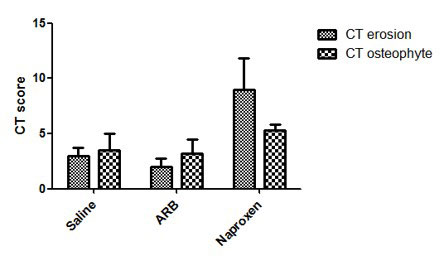Session Information
Date: Monday, November 11, 2019
Title: Spondyloarthritis Including Psoriatic Arthritis – Basic Science Poster
Session Type: Poster Session (Monday)
Session Time: 9:00AM-11:00AM
Background/Purpose: Non-steroidal anti-inflammatory drugs (NSAIDs) have been shown to be efficacious in the treatment of the signs and symptoms of spondyloarthritis (SpA). However, NSAIDs have a variety of side effects on gastrointestinal tract, kidney, and cardiovascular system. Angiotensin II (AT II) mediates several pro-inflammatory responses by signaling through AT type I receptor (AT1R). The recruitment of circulating inflammatory cells to the endothelium and subendothelial space is an early step in the inflammatory response. Ang II can also trigger Toll-like receptor 4 activation in various cell types, which stimulates the innate immunity. In addition, it has been reported that Ang II drives colonic mucosal inflammation by promoting intestinal epithelial cell apoptosis and mucosal TH17 responses in colitis development.
The purpose of this study is to investigate the benefits of angiotensin receptor blocker (ARB) on the bony overgrowth and the bowel inflammation in a SpA animal model.
Methods: ZAP-70W163C–mutant (SKG) mice were housed under specific pathogen free conditions. All of the mice were injected intraperitoneally with 1,3-glucan (curdlan). Mice were treated with ARB and/or naproxen (NXN). Clinical manifestations were scored and the expression of inflammatory molecules were examined. Arthritis, spondylitis, and ileitis were assessed histologically at 8-week experimental end points. A bone mineral density tests (BMD) were conducted as well.
Results: ARB treatments lowered the morphology scores (MS), but NXN did not (Fig 1). The expression of myeloperoxidase was decreased in peripheral and axial joints by ARB but not by NXN, which might be caused by decreased expression of TNF-α, IL-17, IL-22, and IL-23.
The development of erosion and osteophyte was inhibited by ARB, while increased by NXN in bone CTs (Fig 2). ARB decreased the expression of BMP2, RUNX2, and osterix.
Next, we investigated the effect of ARB and NXN on ileitis of the SKG mice. ARB improved ileitis, but NXN significantly aggravated the ileitis which was partially restored on the combination therapy with ARB (Fig 3). In addition, we analyzed the results on BMDs in SKG mice depending on the treatment groups. Both ARB and NXN improved BMDs.
Conclusion: These results indicate that ARB has beneficial effects on the arthritis, ileitis, and osteoporosis in a SpA mice model. Further clinical studies are warranted.
To cite this abstract in AMA style:
Shim S, Choi J, Kim J, Park C. Beneficial Effect of Angiotensin Receptor Blocker in a Spondyloarthritis Animal Model [abstract]. Arthritis Rheumatol. 2019; 71 (suppl 10). https://acrabstracts.org/abstract/beneficial-effect-of-angiotensin-receptor-blocker-in-a-spondyloarthritis-animal-model/. Accessed .« Back to 2019 ACR/ARP Annual Meeting
ACR Meeting Abstracts - https://acrabstracts.org/abstract/beneficial-effect-of-angiotensin-receptor-blocker-in-a-spondyloarthritis-animal-model/



